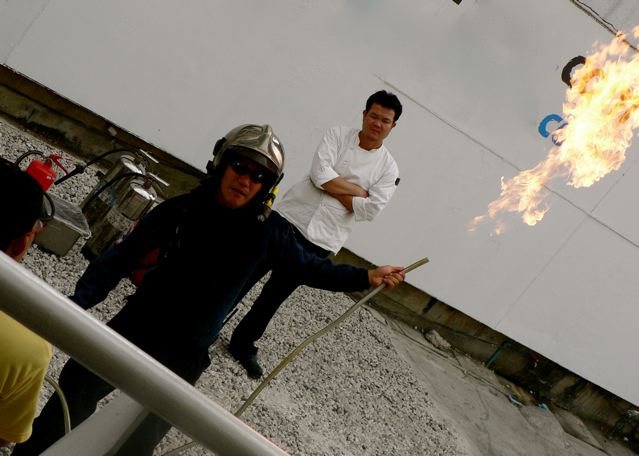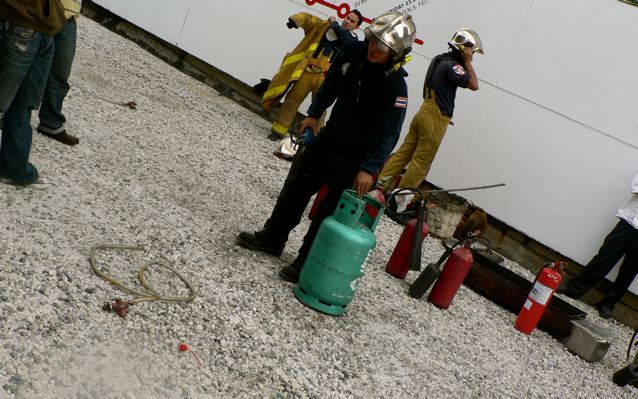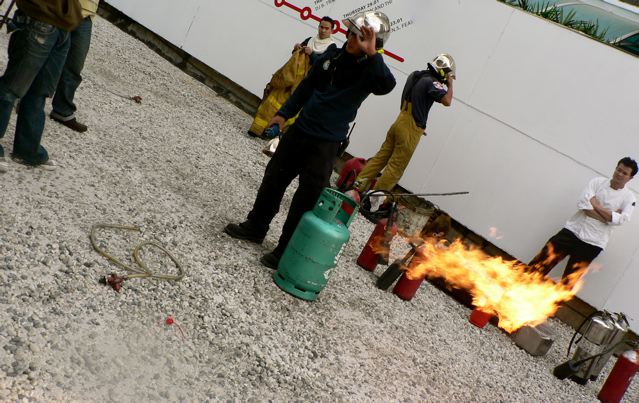Inflatable Breakfast
Thursday, 25 June 2009 by Unknown

"A Light Breakfast" by artist David Sykes, no photoshopperry, just one shot on 5×4 transparency. His Obsessions series looks increasingly like my obsessions.
Thursday, 25 June 2009 by Unknown

Posted in: 98% flavour free, art food fashion | 1 comments | |
Friday, 12 June 2009 by Hock

Posted in: 98% flavour free, Australiana, food politics | 1 comments | |
Tuesday, 20 January 2009 by Hock















Posted in: 98% flavour free, Bangkok, hot hot hot, Thailand | 1 comments | |
Tuesday, 23 December 2008 by Dr Maytel
Posted in: 98% flavour free | 0 comments | |
Sunday, 7 December 2008 by Dr Maytel
Posted in: 98% flavour free | 0 comments | |
Monday, 24 November 2008 by Dr Maytel


Posted in: 98% flavour free, art food fashion, creative reconstructions, critics, food politics, food sculpture, Laura Ashley Vegan, Pork, warfare | 2 comments | |
Thursday, 20 November 2008 by Hock
Posted in: 98% flavour free, Food Industry, pure gangsta, Thailand | 3 comments | |
Monday, 10 November 2008 by Dr Maytel
Posted in: 98% flavour free, Kitchen Equipment | 1 comments | |
Friday, 10 October 2008 by Hock
Posted in: (con)fusion, 98% flavour free, art food fashion, Chicken, creative reconstructions, life imitating food imitating life, NYC, playing with your food, sarcastic tones, Squeamish eats | 1 comments | |
Tuesday, 23 September 2008 by Dr Maytel
A man walked into the Ritz Bar. The bartender said, "I heard that you lost a lot in the crash." The man replied, "I did. But I lost everything I wanted in the boom." This exchange, from F. Scott Fitzgerald's "Babylon Revisited," a story set early in the Depression, suggests how a time of economic crisis can provoke a reckoning with what matters most.
That is not glibly to say, in the manner of a moralizing preacher, that concern with money is trivial, or that worry tied to last week's financial jolts is only greed. Job loss, pension insecurity, threat of foreclosure, the squeeze of debt, rising cost of living - if these problems are not properly a source of anxiety, nothing is.
But what is money? There is a clue in the reference in Fitzgerald's title. Babylon, the ancient Mesopotamian city on the Euphrates River, lives in memory as a place of license and sensuality. If captive in Babylon, it is important to maintain a spirit of detachment from its excesses. That's the Biblical reference.
But in the mists of time, predating the Bible, civilization was itself born in the alluvial plain between the Tigris and the Euphrates. That occurred when nomads - hunters, gatherers, herders - settled in cities that were built around agriculture. One of the main innovations of the settled life based on farming was the capacity to accumulate more than was needed to live. This surplus was both a boon - it enhanced survival - and a curse - it led to the organized thievery of social class. The management of surplus became a valued skill, the idea of wealth was born, and, even allowing for inequity, the human species made its great evolutionary leap.
But money predates agriculture. Anthropologists speculate that the first form of currency - a symbol whose value is imputed rather than inherent - were the pieces of flesh that hunters tore from a vanquished beast. It was not only that successful hunters could then eat to live, but that they could take morsels of meat back to their social circles, however defined. The meat had value in itself, but soon enough it took on transcendent worth.
Indeed, the tearing of flesh from the bones of the killed animal became ritualized, a possible origin of religious sacrifice. A kind of divinity was attributed to the victim, which, after all, was now the source of sustenance, and vestiges of the victim's body were now considered to be holy.
The torn meat became something to exchange, a way to accommodate new divisions of labor, compensating those whose contributions to community survival was less direct than joining in the hunt. A sacred aura hung over the whole enterprise, which may have made it work. The bull as a symbol of the stock market, a contemporary sacred cow, is thought to be rooted in this ancient phenomenon. (The historian Dennis King Keenan suggests that the Latin word pecunia comes from pecus, meaning cattle. The English word "money" comes from the Roman goddess Juno Moneta, in whose temple bulls were sacrificed.) Money's subliminal connection to divinity is enshrined even in the way communion wafers of the Christian liturgy are shaped like coins. A sacrament exists to point beyond itself to something sacred. It is not too much to say that the first sacrament was money.
Meat as a form of currency makes the meaning of money clear. Nutrition is what humans need to live. Stored nutrition, managed by a system of credit, is what humans need to live without obsessing about the next meal. All that we associate with civilization followed from that freedom - from writing to art to concern with consciousness itself. Civilization erected walls to protect against the contingency of existence on a dangerous planet, and the chief emblem of that protection is money.
Because direct awareness of normal human vulnerability - the beasts are still out there - is so frighteningly immobilizing, it became normal to think that what protects us is absolutely trustworthy. That is why primitive humans began to explicitly regard their money as divine, and it is why, equally, if less explicitly, we do, too.
But, in fact, the money is not what protects us. Nor do the gods. Human inventiveness is our protection, and that remains firmly on display.
Posted in: 98% flavour free, food history, Meat | 0 comments | |
Tuesday, 9 September 2008 by Dr Maytel
Posted in: 98% flavour free, art food fashion, creative reconstructions, food and beauty | 0 comments | |
Monday, 8 September 2008 by Dr Maytel
Posted in: 98% flavour free, art food fashion, food and beauty, playing with your food, Seafood | 0 comments | |
Wednesday, 25 June 2008 by Dr Maytel
Posted in: 98% flavour free | 0 comments | |
Monday, 16 June 2008 by Dr Maytel





Posted in: 98% flavour free, Food Preparation, Kitchen Equipment | 2 comments | |
Wednesday, 21 May 2008 by Dr Maytel
Hangovers are probably as old as alcohol use, which dates back to the Stone Age. Some anthropologists have proposed that alcohol production may have predated agriculture; in any case, it no doubt stimulated that development, because in many parts of the world the cereal harvest was largely given over to beer-making
Posted in: "in praise of blandness", 98% flavour free, agriculture, Alcohol, Drinks, Food Industry, Food News, food politics, Food Preparation, Food Safety | 1 comments | |
Friday, 16 May 2008 by Dr Maytel
Posted in: (con)fusion, 98% flavour free, Food ethics | 0 comments | |
Wednesday, 14 May 2008 by Dr Maytel
...organically reared cows burp twice as much methane as conventionally reared cattle – and methane is 20 times more powerful a greenhouse gas than CO2. Meat and poultry are the largest agricultural contributors to GHG emissions. Life Cycle assessment counts the energy used to manufacture pesticide for growing cattle feed, but still shows that a kilo of organic beef releases 12 per cent more GHGs, causes twice as much nutrient pollution and more acid rain.
Organic potatoes use less energy in terms of fertiliser production, but need more fossil fuel for ploughing. A hectare of conventionally farmed land produces 2.5 times more potatoes than an organic one.
Actually, organic farmers also use pesticides. The difference is that "organic" pesticides are so dangerous that they have been "grandfathered" with current regulations and do not have to pass stringent modern safety tests. For example, organic farmers can treat fungal diseases with copper solutions. Unlike modern, biodegradable, pesticides copper stays toxic in the soil for ever. The organic insecticide rotenone (in derris) is highly neurotoxic to humans – exposure can cause Parkinson's disease. But none of these "natural" chemicals is a reason not to buy organic food; nor are the man-made chemicals used in conventional farming
The proponents of organic food – particularly celebrities, such as Gwyneth Paltrow, who have jumped on the organic bandwagon – say there is a "cocktail effect" of pesticides. Some point to an "epidemic of cancer". In fact, there is no epidemic of cancer. When age-standardised, cancer rates are falling dramatically and have been doing so for 50 years.
If there is a "cocktail effect" it would first show up in farmers, but they have among the lowest cancer rates of any group. Carcinogenic effects of pesticides could show up as stomach cancer, but stomach cancer rates have fallen faster than any other. Sixty years ago, all Britain's food was organic; we lived only until our early sixties, malnutrition and food poisoning were rife. Now, modern agriculture (including the careful use of well-tested chemicals) makes food cheap and safe and we live into our eighties.
This high level of infection among organic chickens could cross-contaminate non-organic chickens processed on the same production lines. Organic farmers boast that their animals are not routinely treated with antibiotics or (for example) worming medicines. But, as a result, organic animals suffer more diseases. In 2006 an Austrian and Dutch study found that a quarter of organic pigs had pneumonia against 4 per cent of conventionally raised pigs; their piglets died twice as often. Disease is the major reason why organic animals are only half the weight of conventionally reared animals – so organic farming is not necessarily a boon to animal welfare.
The study that found higher flavonoid levels in organic tomatoes revealed them to be the result of stress from lack of nitrogen – the plants stopped making flesh and made defensive chemicals (such as flavonoids) instead
Less than 1 per cent of the food sold in Britain is organic, but you would never guess it from the media.
Posted in: 98% flavour free, Food ethics, Food Industry, Food News, Meat, organic/bio food, Vegetables | 3 comments | |
Sunday, 4 May 2008 by Dr Maytel
Posted in: 98% flavour free, agriculture, food history, Pork | 0 comments | |
Wednesday, 30 April 2008 by kinakoJam
Vouchers that permit low-income women to shop at a local farmers’ market increase fruit and vegetable consumption in poor families, a new study shows.
The research, published this month in the American Journal of Public Health, comes just as states are making important changes to national nutrition programs. For years, the federally-funded Women, Infants and Children (W.I.C.) program, which subsidizes food purchases for low-income women and young children, hasn’t included fruits and vegetables, except for fruit juice and carrots for breastfeeding women. After a push by health groups and a recent report from the Institute of Medicine, the United States Department of Agriculture in December revised W.I.C. to include monthly subsidies for fruits and vegetables. States will begin implementing the new rules in February.
While this latest report shows that subsidizing fruit and vegetable purchases can make a big difference in eating habits among low-income people, it also suggests that the new amounts recently approved for W.I.C. fall far short of what is needed. The U.C.L.A. study gave women $10 a week, while the W.I.C. program will provide monthly vouchers worth $8 to each recipient and $6 to each child. Breastfeeding women will receive just $10 a month toward fruits and vegetables.
Posted in: 98% flavour free, agriculture, American Food, Food ethics | 0 comments | |
Tuesday, 29 April 2008 by Dr Maytel
Posted in: 98% flavour free | 2 comments | |
Copyright 2007 | All Rights Reserved.